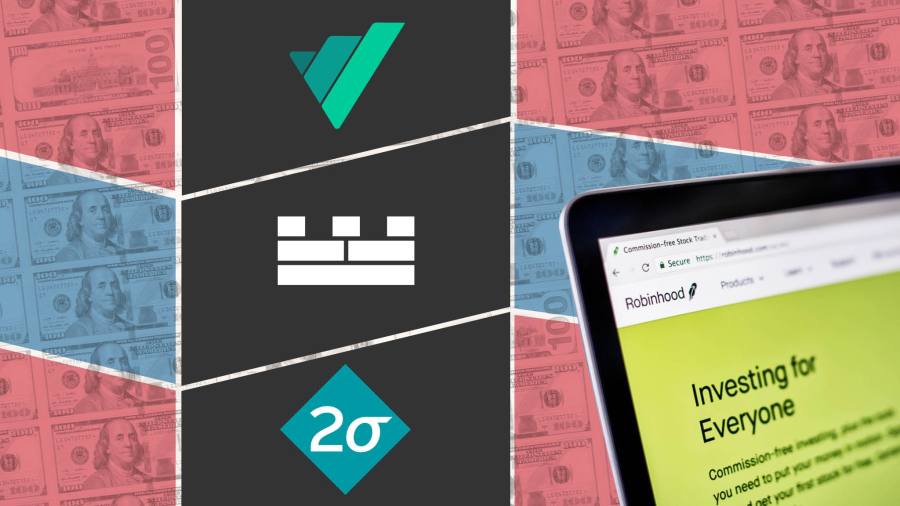[ad_1]
Wall Street trading firms paid almost $3bn to retail brokers such as Robinhood to handle their trades last year — a practice that is attracting rising scrutiny in Washington.
Monthly regulatory filings collated by Bloomberg show “payment for order flow†earned US brokers $2.9bn in 2020. TD Ameritrade generated fees of $1.1bn between its broker-dealer and clearing divisions, while rival Robinhood grew fastest, earning fees of almost $700m.
The lucrative practice allows brokers catering to amateur investors to earn substantial fees without charging a commission for bets on equities and options. It has shot into focus after chaotic trading ignited by users of Reddit’s r/WallStreetBets forum, leaving many small investors surprised to find that their trading was feeding another part of the financial machine.
Elizabeth Warren, the Democrat senator, said this week she had “troubling concerns†about the companies that execute Robinhood’s trades, singling out Ken Griffin’s Citadel Securities. Warren said she was worried the market maker had forced Robinhood to restrict trading in certain shares during last week’s tumult.
“The public deserves a clear accounting of Robinhood’s relationships with large financial firms and the extent to which those relationships may be undermining its obligations to its customers,†she said in a letter on Tuesday.

Robinhood did not respond to requests for comment on the matter, while Citadel Securities said the firm had “not instructed or caused any brokerage firm to stop, suspend, or limit trading or otherwise refuse to do businessâ€.
In an interview with the Financial Times, Securities and Exchange Commission Democratic commissioner Caroline Crenshaw said a key question for the Wall Street regulator was whether brokers’ “incentives are properly aligned with their customers’ interestsâ€.
“The things I am focused on right now are looking at broker-dealers and how they are treating customers, whether their practices are fair, whether they are equitable, whether they are transparent,†she added.
Payment for order flow involves a trading firm known as a market maker paying a broker in return for orders for shares or options from retail traders. Market makers such as Citadel Securities, Virtu Financial and Susquehanna agree in turn to execute the trade at or better than current market prices.
The market makers, which use computing power to execute trades at extraordinary speed, have elbowed traditional investment banks out of the market. They now sit on one side of more than three of every 10 trades that take place outside traditional exchanges, according to the Financial Industry Regulatory Authority.
The practice, which is all but banned in jurisdictions such as the UK, has been the subject of intense controversy.
“We think payment for order flow is distortive,†said Joe Saluzzi, co-founder of Themis Trading and a critic of US equity market structure. “It should be banned. All this flow is not getting through to the true marketplace because it goes directly to the market maker.â€
Proponents say the system creates an incentive to draw buyers and sellers into the market and provides a better deal for investors than they would get on an exchange such as those operated by Nasdaq and New York Stock Exchange. They say retail investors benefit from the highly competitive US equity market and that the practice results in better prices.Â

“You vigorously compete for the inbound order flow. The execution quality for retail is better than it has ever been,†said Shane Swanson, an analyst at Greenwich Associates and former Citadel Securities employee. But he added: “The communication of how this all works could have been done much better.â€
Brokers typically charge each of their market makers the same rate for payment. The market makers then compete with each other for brokers’ orders based on the spread of a trade — the gap between what a seller wants and a buyer will pay.
The spread consists of improved prices to the broker’s customers, the broker’s payment and a sliver to make the trade profitable.
It is typically down to the broker to determine the split between what is handed to the customer as an improved price and what it keeps as payment.
The industry improved prices for investors for shares and options by a total of $3.7bn last year, Bloomberg data show. Citadel Securities provided the most, with almost $1.5bn in improved prices on share deals. As the largest market maker, it also paid the most fees to brokers, at $1.1bn.
Among retail brokers, Robinhood received the highest fees for equity and option trades, at $0.23 and $0.62 per 100 shares respectively, data collated by Piper Sandler show. Rich Repetto, an analyst at Piper, said Robinhood’s higher fees reflected that it used different metrics to define payment, compared with other online brokers.
The SEC has previously investigated whether Robinhood gets the best deal for its customers. Robinhood agreed in December to pay a $65m penalty to settle charges that it had failed to provide the best reasonably available terms for customer orders. Robinhood said at the time that its practices “do not reflect Robinhood todayâ€.
“This week has put the spotlight on equity market structure,†said Kirsten Wegner, a DC lobbyist with the Modern Markets Initiative, which represents a small group of proprietary market makers. “I think this might propel Congress to revisit issues like payment for order flow.â€
[ad_2]
Source link





